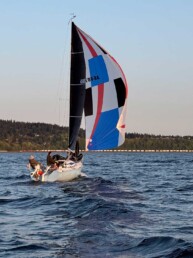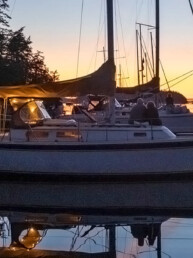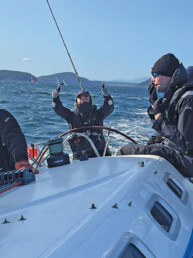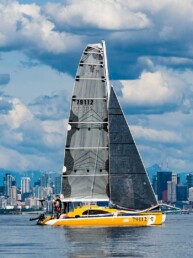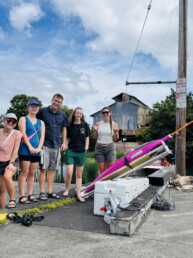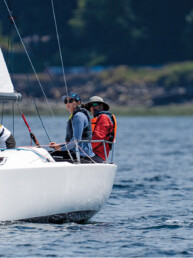A legendary sailmaker passes the torch to a Port Townsend maritime trades collective.
This article was originally published in the February 2022 issue of 48° North.
For a time, it seemed that one of Port Townsend’s most venerable maritime businesses, launched by an iconic figure whose work is admired by cruising sailors worldwide, was nearing its end.
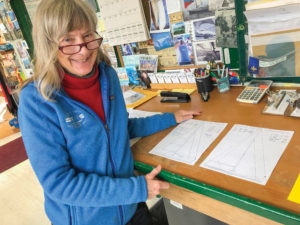
Carol Hasse, founder and owner of one of the only woman-owned sail lofts in the world, had long planned to retire when she turned 70 in February 2021. That meant selling Hasse & Company Port Townsend Sails, the business she’d started 43 years earlier in the airy, 1940s former Navy building with sweeping views over Point Hudson Marina and Admiralty Inlet beyond.
Hasse announced her plans to retire at the 2019 Port Townsend Wooden Boat Festival, and the response from customers was immediate. Within a couple of weeks, the loft’s work schedule was booked out to Hasse’s retirement date by sailboat owners coveting the meticulously crafted sails she is renowned for.
“The phones rang off the hook for three days, and suddenly we were booked out,” recalls Alison Wood, one of the loft’s sailmakers. “Everybody scrambled, because they wanted our sails and they realized there wasn’t a buyer (for the business) yet.”
Hasse wasn’t worried. She simply could not imagine that the loft might close. But almost a year after her announcement, with her retirement date creeping up, there was still no buyer. Several people had expressed interest, but they eventually all backed out. Sailmaking is not a high-margin business, particularly the way Hasse and her crew do it, crafting their sails in-house from start to finish instead of outsourcing much of the production offshore, as most lofts do to keep costs down.
There was also the daunting prospect of filling the oversized shoes Hasse was stepping out of. Living up to her reputation for making the highest-quality sails available — with skills and knowledge gleaned through almost a half-century of practicing her craft — could deter even the most ambitious entrepreneur.
Competing with Hasse would be hard enough, but her influence reaches far beyond the sail loft. Hasse (pronounced HAH-see), as friends call her, has long been a powerful advocate for preserving and promoting Port Townsend’s maritime trades. She is a founding board member of the Wooden Boat Foundation and helped launch Port Townsend’s famous Wooden Boat Festival. She has served on the boards of the Northwest School of Wooden Boatbuilding and the Northwest Maritime Center, and in January began her first term as a Port Townsend port commissioner. In 2021, she was named Citizen of the Year in the Jefferson County Community Leadership Awards.
Friend and fellow sailor Kaci Cronkhite describes Hasse as a tireless community-builder who is always ready to offer support or lend a hand.
“Hasse has always been willing to problem-solve in a group, to tweak plans, to stand an extra watch, to lead in a storm, to listen and seek peace, to give all she had in energy and time to get whatever we were working on moving forward or safely hove-to so we could move forward again when the storm passed,” Cronkhite says. “Her legacy is as big as her giant heart.”
In person, Hasse is warm and generous, with an unassuming nature that underplays her sharp intellect — she was awarded a prestigious National Merit Scholarship — and inquisitive, analytical mind. Friends say she is a person who lives her beliefs, inspires others, and is deeply committed to her craft.
Nancy Erley, who has known Hasse since she enlisted her as sailing master for the first leg of a 1989 global circumnavigation Erley led, recalls sitting up with her late at night on trips back home to Port Townsend. Erley’s boat was outfitted with Hasse sails, and her friend would pepper her with questions about how they were working and what might be improved.
“She really cares about what she’s doing, what her life’s work is,” Erley says. “She really cares about making things perfect for everybody’s boat. And she understands the working of the sails profoundly.”
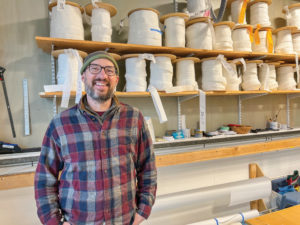
Sailmaker Sandy Goodall worked with Hasse for more than 20 years as a sail design consultant. Of the 125-plus sail lofts Goodall has worked with around the world, Hasse was, as far as he knows, the only female loft owner, thriving in what is still a male-dominated field.
“She’s very personable, very outgoing, very knowledgeable, very confident,” Goodall says. “She attracts people. She has all the right tools, including personality, to go out into this highly competitive market where a lot of men are running around full of testosterone, believing they know more than any woman could ever know. And she proves them wrong.”
Despite Hasse’s reputation and success, by the summer of 2020, the future of the sail loft was looking grim. A state Covid-19 mandate closed the business for 10 weeks that spring, prompting a few of the loft’s five employees to seek temporary work elsewhere. Wood took a landscaping job; another sailmaker did canvas and repair work. When the loft reopened, its repair department had to be closed so the small crew could finish the sails that had been promised to boat owners before the February 2021 deadline, creating a cash flow problem that Hasse solved with a home equity loan.
Hasse felt the weight of responsibility for her employees, who had stuck with her without knowing if they would have a job in the end. Not coming through for them would have been heartbreaking to her.
“I would have felt like a personal failure in that regard, and I would have felt just a failing to the craft of sailmaking to not have (the business)
go forward,” she says.
The uncertainty was hard on everyone. “It was a rollercoaster, and different for all of us,” says sailmaker Erica Georgaklis. “We’ve all been at the loft different amounts of time. We all have different dreams and plans.”
But aside from one employee who left to pursue other interests, the all-female crew, who have more than 40 years of combined experience (one employee has been there 21 years) stayed and hoped for the best. Individual crew members thought about buying the business, Georgaklis says, but it wasn’t feasible financially, and perhaps more significantly, culturally.
“We were already a small crew and we worked as a team,” she says. “It was hard to envision any one of us being the boss over the other ones. It wouldn’t work.”
Unbeknownst to the crew, discussions about the loft’s future were taking place about a mile and a half away on the other end of town, at the Port Townsend Shipwrights Co-Op. Located in Boat Haven boatyard, the co-op was formed in 1981 to bring together craftspeople in various marine trades. It currently has 12 member owners and 55 employees and offers services ranging from metal fabrication to rigging and woodworking.
Co-op President David Griswold shares Hasse’s commitment to the area’s maritime industry; about 15 years ago, he helped form the Port Townsend Marine Trades Association to provide a collective voice for the region’s maritime workers. Griswold knew Hasse hadn’t found a buyer for the loft, and he was concerned. The closure of the loft would be a blow to Port Townsend’s close-knit marine trades community, one less potential draw for boat owners to bring vessels needing work to the remote town of around 10,000 on the northeastern tip of Washington’s Olympic Peninsula.
“Our philosophy at the shipwrights co-op is that we’re better as a whole than we are as individual businesses,” Griswold says. “So as a company, we looked at the possibility of Carol’s business closing and said, ‘Hey, this can’t happen. Is there anything we can do?’”
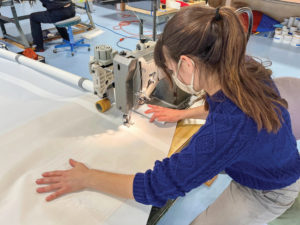
Griswold and the other co-op owners started crunching numbers, trying to figure out how to make a purchase of Hasse’s business pencil out. Griswold knew retaining Hasse’s skilled crew was critical to making the deal a success.
“It was largely because of the sailmakers that were there — how skilled they are, how engaged, how capable they were — that I knew it would work,” he says.
The merger would also only be feasible by relocating the sail loft from Point Hudson to a co-op-owned building at Boat Haven to keep overhead down and bring employees together in one location. But moving the business meant the end of an era that started when Hasse and a group of like-minded souls with saltwater dreams arrived in Port Townsend in the 1970s and kickstarted the town’s marine trades renaissance.
Much of that activity was centered around Point Hudson, with Hasse’s sail loft and Brion Toss Yacht Riggers, which is still downstairs in the same building, at its heart. Leaving the old location behind “was very hard,” Wood says. “It’s still hard. I feel bad for the building mates we left behind. You have these friendships and they’re still your people.”
On the last working day of 2020, Griswold and a few other co-op owners gathered with Hasse and her crew at the old loft for a party to celebrate the signing of an earnest agreement for the purchase. For Hasse, merging her loft with an organization led by Griswold, “a man of integrity and kindness,” was the right outcome.
“They’re an established business that’s highly successful and respected. There’s this continuity of a company that’s always stood by its work, always cared for its employees,” she says. “That was what I wanted the new owner to be.”
The merger was finalized in March, and in October the loft moved to its new home, a freshly renovated two-level space in the boatyard across from the popular Blue Moose Café. Griswold and Georgaklis spent several months working closely with Hasse to learn her approach to sail inventory recommendations and communicating with customers.
“The most daunting part for us all is, how were we going to get what was in Carol’s head into our heads?” Griswold says. “She accumulated that knowledge over 43 years and even prior to that, with all her sailing experience and engagement with sailing and her passion for sailing all these years.”
Hasse worked with the crew into the summer, advising on sail designs and gradually stepping away to undertake a long-planned cruise through south Puget Sound in her 1959 25-foot Nordic Folkboat, Lorraine, which she’s owned since 1979. She plans to stay involved with the loft as a consultant and hopes to start writing a book soon.
If she was still 27, if she had decades stretching out in front of her, she would sign up for another 43 years, she says.
“I loved my work,” Hasse says. “It was the greatest blessing, the travel and sailing and being in different ports all over the world.”
Hasse grew up in Camas in southern Washington, on the Columbia River Gorge. From her bedroom window, she would look out at the river, Mount Hood rising majestically
to the south, and dream of climbing peaks and getting out on the water.
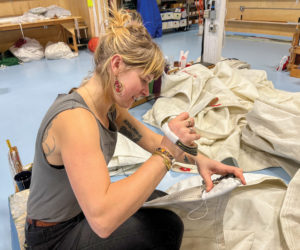
Given her academic prowess, Hasse was expected to go to college, and she initially hoped to become a hospital ship doctor. But after a year of classes at the University of Puget Sound, Hasse was restless and wanted to see the world. She hit the road, hitchhiking alone through 23 countries and making it as far as the border of Iraq and Syria before returning to the U.S.
Hasse got her first experience boating when family friends invited her to join them on a cruise to San Francisco. That was followed by crewing and teaching stints on boats to Mexico, Costa Rica, the Galapagos, Hawaii, the South Pacific, the Caribbean, Alaska, and other locations. Hasse has logged more than 35,000 nautical miles, sailing on everything from wooden gaff-rigged vessels to tall ships.
Early on, Hasse knew she wanted her own boat and joined with a group of friends to build a “hippie commune boat” in Bellingham. Tasked with making sails for the Skookum 47, Hasse got a job at the Seattle loft of master sailmaker Franz Schattauer, a German immigrant who learned his trade in the European craft guild tradition.
From Schattauer, Hasse learned the traditional methods she brought to her own business — hand-stitched leather on corners, extra layers of sail cloth for chafe protection, hand-sewn rings instead of grommets. Most of Hasse’s customers are bluewater-bound cruisers, and her sails are designed to be “Cape Horn-worthy” and able to be repaired by hand at sea.
Only a handful of U.S. sail lofts still use the traditional methods Port Townsend Sails does, and almost none make sails from start to finish; Hasse can name only half a dozen on both coasts. If her loft closed, it would have meant the loss of the centuries of tradition and craft Hasse and her crew have carried forward, and of an inestimable body of knowledge embodied in their work.
“It’s almost unfathomable what it would have been like,” Georgaklis says. “We get cruisers coming through and being like, ‘I have heard about Hasse sails since I was a kid,’ or ‘I’ve seen Hasse sails all over the Mediterranean and in the Korean Sea,’ and here and there and everywhere.’”
The business living on and remaining in Port Townsend means “everything,” Cronkhite says. “It’s proof that people still value hands-on, heart-driven work. It proves that maritime
trades businesses are viable through turbulent times and generational shifts.”
Port Townsend Sails recently hired two new sailmakers and is booked out over a year with orders. The crew has settled into the new space, and is adjusting to taking on new responsibilities Hasse once handled and being part of a bigger venture.
“It’s a lot,” Wood says. “But it’s all good, and it’s fun and it’s exciting.”
The sale of the business Hasse launched so long ago represents a changing of the guard in Port Townsend, as a new generation of tradespeople and artisans shapes the next chapter in the town’s rich maritime legacy. What won’t change is the approach Hasse is known for, of creating sails made on Northwest shores that can take boats around the world,
and carrying forward the craft practiced by centuries of sailmakers before her.
“I just feel so privileged,” Hasse says, “to be a link in that.”

